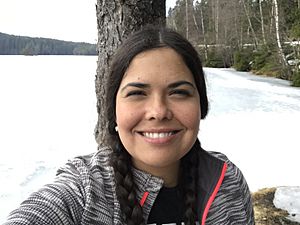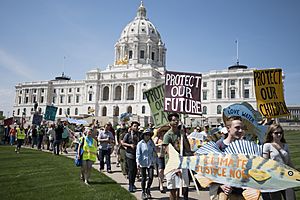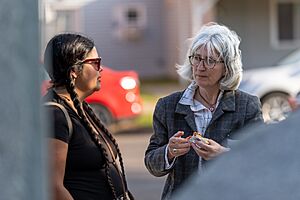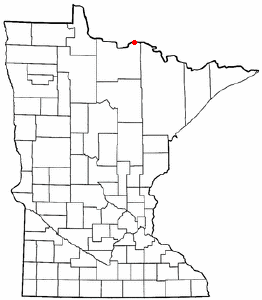Tara Houska facts for kids
Quick facts for kids
Tara Houska
|
|
|---|---|
| Zhaabowekwe | |

Tara Houska in 2017
|
|
| Born | |
| Organization | Not Your Mascot Giniw Collective |
| Known for | Environmental activism, indigenous activism |
Tara Houska, also known as Zhaabowekwe, is a tribal attorney and a strong voice for climate justice. She is a member of the Couchiching First Nation. She works to protect the land and fight for the rights of Indigenous people.
Contents
Protecting the Earth and People
Speaking Up for Native Americans
Tara Houska helped start an organization called Not Your Mascots. This group teaches people about stereotypes and how Native Americans are shown in media. They worked to change the name of Washington, D.C.'s football team, which used to have a name that was offensive to Native Americans.
Fighting Oil Pipelines
Houska founded and leads the Giniw Collective. For seven years, she and her group fought against the building of the Line 3 pipeline. This pipeline carries oil from Alberta, Canada, to Wisconsin, USA. For three of those years, she lived in a tent along the pipeline's path, even during cold winters.
The land where the pipeline crosses is important to tribal nations. They have special rights to hunt, fish, and gather food there. Many rivers and lakes are also in the pipeline's path. Wild rice, which is very important to their culture, grows in these areas.
The Giniw Collective often uses peaceful protests to stop or slow construction. They have crawled inside the pipeline, sat in trees, and tied themselves to machines. Tara Houska also met with government leaders, like the Biden administration, to ask them to stop the project. She is known as a main leader in the movement to stop new pipelines.
Before this, Houska also fought against the Dakota Access Pipeline in 2016. She lived at the Standing Rock protest camp for six months during that time.
Other Important Work
Tara Houska is involved in many other efforts for climate and social justice. She has written articles for well-known magazines and newspapers like Vogue and the New York Times. She also wrote for the Indian Country Media Network. From 2016 to 2019, she was the campaign director for Honor the Earth, an environmental group.
She also worked as an advisor for Senator Bernie Sanders. During his 2016 presidential campaign, she helped write his plans for Native American policies. In 2021, Houska spoke at a meeting of the European Green Party about climate change and protecting nature.
Awards and Recognition
Tara Houska has received several awards for her important work:
- In 2023, she won the Rose-Walters Prize for Global Environmental Activism from Dickinson College. This award recognized her work as a tribal attorney, land defender, and leader of the Giniw Collective.
- She also received the American Climate Leadership Award in 2021.
- In 2019, she was given the Rachel's Network Catalyst Award.
- Melinda French Gates honored Houska with the Good Housekeeping 2017 Awesome Women award.
About Tara Houska
Tara Houska was born in International Falls, Minnesota. She grew up in Ranier, Minnesota, a town where Rainy Lake connects to Rainy River. Ranier is right across the border from the Couchiching First Nation community in Ontario, Canada.
She graduated from Falls High School. She then earned a law degree from the University of Minnesota. While studying law, she also learned the Anishinaabe language. After law school, she moved to Washington, D.C., and worked for a law firm that helped tribes across the country.
In Washington, D.C., Tara Houska met Winona LaDuke, another important environmental activist. Houska later worked as a lawyer for LaDuke's environmental group, Honor the Earth. Since 2019, she has focused her work on the Giniw Collective and the Stop Line 3 protests.
 | Madam C. J. Walker |
 | Janet Emerson Bashen |
 | Annie Turnbo Malone |
 | Maggie L. Walker |




